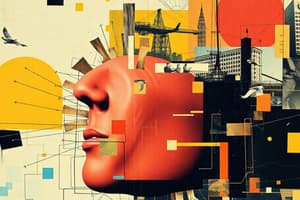Podcast
Questions and Answers
What is a possible example of negative reinforcement?
What is a possible example of negative reinforcement?
- A child is given a time-out for misbehaving.
- A student is praised for completing their homework.
- A dog is given a treat for sitting on command.
- A person is allowed to go to a movie after cleaning their room. (correct)
Which of the following best describes the concept of 'positive punishment'?
Which of the following best describes the concept of 'positive punishment'?
- Adding something undesirable to decrease a behavior. (correct)
- Removing something desirable to decrease a behavior.
- Adding something desirable to increase a behavior.
- Removing something undesirable to increase a behavior.
What is the main focus of cognitivism?
What is the main focus of cognitivism?
- How the mind processes, stores, and retrieves information. (correct)
- How observable behaviors are learned.
- How people are motivated by rewards and consequences.
- How children develop social skills through interaction.
What is the primary way a child learns about the world during the sensorimotor stage of cognitive development?
What is the primary way a child learns about the world during the sensorimotor stage of cognitive development?
Which of the following is NOT mentioned in the text as one of Piaget's stages of cognitive development?
Which of the following is NOT mentioned in the text as one of Piaget's stages of cognitive development?
What is the difference between positive reinforcement and negative reinforcement?
What is the difference between positive reinforcement and negative reinforcement?
How does the text describe the human mind in terms of cognitivism?
How does the text describe the human mind in terms of cognitivism?
What is the purpose of incentives in operant conditioning?
What is the purpose of incentives in operant conditioning?
What is the main focus of behaviorist theory?
What is the main focus of behaviorist theory?
Which of the following is NOT a key characteristic of andragogy, as described in the text?
Which of the following is NOT a key characteristic of andragogy, as described in the text?
In the context of classical conditioning, what does the term 'stimulus' refer to?
In the context of classical conditioning, what does the term 'stimulus' refer to?
Which of the following is an example of operant conditioning, as described in the text?
Which of the following is an example of operant conditioning, as described in the text?
What is the main difference between classical conditioning and operant conditioning?
What is the main difference between classical conditioning and operant conditioning?
Which of the adult learning theories is most closely aligned with the idea of personal growth and transformation?
Which of the adult learning theories is most closely aligned with the idea of personal growth and transformation?
Why is it important for managers and HR professionals to understand adult learning theories?
Why is it important for managers and HR professionals to understand adult learning theories?
Based on the information provided, which of the following is NOT a key feature of connectivism?
Based on the information provided, which of the following is NOT a key feature of connectivism?
How does the training program cater to the specific needs of lawyers?
How does the training program cater to the specific needs of lawyers?
Which of the following elements is NOT a benefit of applying the principles of Adult Learning Theory to the training program?
Which of the following elements is NOT a benefit of applying the principles of Adult Learning Theory to the training program?
Which of the following is NOT a challenge associated with implementing transformative learning in a professional setting?
Which of the following is NOT a challenge associated with implementing transformative learning in a professional setting?
The example of the nurse undergoing transformative learning in a healthcare setting demonstrates which principle of the theory?
The example of the nurse undergoing transformative learning in a healthcare setting demonstrates which principle of the theory?
What is a potential outcome of applying transformative learning to a training program?
What is a potential outcome of applying transformative learning to a training program?
What key element of the Transformative Learning Theory is illustrated by the nurse's experience in the example?
What key element of the Transformative Learning Theory is illustrated by the nurse's experience in the example?
Which of the following is NOT a characteristic of transformative learning?
Which of the following is NOT a characteristic of transformative learning?
How does the training program described in the text align with the principles of Adult Learning Theory?
How does the training program described in the text align with the principles of Adult Learning Theory?
Which stage of cognitive development is characterized by the ability to use logic and think about the world in concrete terms?
Which stage of cognitive development is characterized by the ability to use logic and think about the world in concrete terms?
The Information Processing Model likens the human mind to a computer. What are the three main components of this model?
The Information Processing Model likens the human mind to a computer. What are the three main components of this model?
Which of the following learning theories emphasizes the importance of learners' active involvement in constructing their own knowledge through experiences?
Which of the following learning theories emphasizes the importance of learners' active involvement in constructing their own knowledge through experiences?
According to the Information Processing Model, how are new instructions or skills most effectively learned in a training program?
According to the Information Processing Model, how are new instructions or skills most effectively learned in a training program?
How does Adult Learning Theory (Andragogy) suggest that lawyers in a law firm should be trained on new legal software?
How does Adult Learning Theory (Andragogy) suggest that lawyers in a law firm should be trained on new legal software?
Which of the following is NOT a key principle of Adult Learning Theory (Andragogy)?
Which of the following is NOT a key principle of Adult Learning Theory (Andragogy)?
The Information Processing Model, when applied to a photocopying shop, would focus on:
The Information Processing Model, when applied to a photocopying shop, would focus on:
Which of these stages involves understanding abstract and hypothetical ideas?
Which of these stages involves understanding abstract and hypothetical ideas?
Flashcards
Andragogy
Andragogy
Theory emphasizing self-directed learning in adults.
Experiential Learning
Experiential Learning
Learning through experience rather than theory.
Transformative Learning
Transformative Learning
Encourages reflection and personal growth for adults.
Connectivism
Connectivism
Signup and view all the flashcards
Behaviorism
Behaviorism
Signup and view all the flashcards
Classical Conditioning
Classical Conditioning
Signup and view all the flashcards
Operant Conditioning
Operant Conditioning
Signup and view all the flashcards
Reinforcement
Reinforcement
Signup and view all the flashcards
Concrete Operations Stage
Concrete Operations Stage
Signup and view all the flashcards
Formal Operations Stage
Formal Operations Stage
Signup and view all the flashcards
Information Processing Model
Information Processing Model
Signup and view all the flashcards
Sensory Memory
Sensory Memory
Signup and view all the flashcards
Short-Term Memory
Short-Term Memory
Signup and view all the flashcards
Long-Term Memory
Long-Term Memory
Signup and view all the flashcards
Constructivism
Constructivism
Signup and view all the flashcards
Adult Learning (Andragogy)
Adult Learning (Andragogy)
Signup and view all the flashcards
Practical Training
Practical Training
Signup and view all the flashcards
Adult Learning Theory
Adult Learning Theory
Signup and view all the flashcards
Critical Reflection
Critical Reflection
Signup and view all the flashcards
Disorienting Dilemmas
Disorienting Dilemmas
Signup and view all the flashcards
Perspective Transformation
Perspective Transformation
Signup and view all the flashcards
Transformative Learning Benefits
Transformative Learning Benefits
Signup and view all the flashcards
Technological Barriers
Technological Barriers
Signup and view all the flashcards
Resistance to Change
Resistance to Change
Signup and view all the flashcards
Negative Reinforcement
Negative Reinforcement
Signup and view all the flashcards
Positive Reinforcement
Positive Reinforcement
Signup and view all the flashcards
Positive Punishment
Positive Punishment
Signup and view all the flashcards
Negative Punishment
Negative Punishment
Signup and view all the flashcards
Cognitivism
Cognitivism
Signup and view all the flashcards
Piaget's Stages of Cognitive Development
Piaget's Stages of Cognitive Development
Signup and view all the flashcards
Sensorimotor Stage
Sensorimotor Stage
Signup and view all the flashcards
Preoperational Stage
Preoperational Stage
Signup and view all the flashcards
Study Notes
Adult Learning Theories
- Andragogy emphasizes self-directed learning and practical application
- Experiential learning focuses on learning through experience
- Transformative learning encourages reflection and personal growth
- Connectivism is a modern learning theory
- These theories help managers and HR design training that respects adult learners' need for autonomy, relevance, and immediate applicability
Behaviorism
-
Human learning and habit formation are the core of behaviorist theory.
-
This theory proposes that behavior is learned through interaction with the external environment (people, objects, surroundings).
-
John B. Watson established behaviorism in 1913, separating it as a distinct study area in psychology
-
Environmental reinforcement and rewards influence human behavior
-
Behavioral responses to stimuli are related to the learning process.
-
Behaviorism presents two key conditioning theories:
- Classical Conditioning (stimulus-response theory) by Pavlov
- Operant Conditioning theory by B.F. Skinner
Classical Conditioning
- Individuals learn through association.
- For example, praise (stimulus) for meeting deadlines (response) in a workplace. Reinforcing the behavior, motivating continued high performance
- Classical conditioning occurs when a dog learns to associate the bag of dog food with excitement
Operant Conditioning
- Learning occurs through positive or negative reinforcement
- Examples: Awarding high-performing employees, giving sales bonuses, recognition for excellent work; all strengthen positive behaviors
- Deductions from salary for tardiness strengthens the habit to be on time
Cognitivism
-
This theory emphasizes the mind's role in learning (thinking, storing knowledge, and applying it to situations).
-
Human mind is like an information processor
-
Cognitivism focuses on how individuals receive, organize, store, and retrieve information
-
Two key cognitive learning theories:
- Piaget's Stages of Cognitive Development
- Information Processing Model
Piaget's Stages of Cognitive Development
-
Piaget described four stages of intellectual development in childhood:
- Sensorimotor stage: Learning through senses
- Preoperational stage: Language and pretend play emerge
- Concrete operational stage: Logic and concrete reasoning develop
- Formal operational stage: Abstract and hypothetical thinking develops
Information Processing Model
-
The human mind is likened to a computer
-
Information is encoded, stored, and retrieved
-
The model has three key components:
- Sensory Memory: Briefly holds incoming information
- Short-Term Memory: Actively processes and temporarily stores information
- Long-Term Memory: Stores information for future retrieval
Constructivism
-
Learners acquire knowledge through experience and cooperation
-
Experiences lead to developing interpretations by collaborating with and constructing meaning together.
-
There are several theories within Constructivism
- Social Constructivism Theory
- Bruner's Learning Theory
- Kolb's Experiential Learning Cycle
- Adult Learning/ Andragogy
- Transformative Learning theory
Social Constructivism
- Learning is influenced by observing, copying, and imitating behaviors and emotions of others
- Emphasizes social interaction and collaboration, encouraging knowledge sharing
Bruner's Learning Theory
- Emphasizes discovery learning as a way to construct knowledge
- Promotes exploration and problem-solving for retention
Kolb's Experiential Learning Cycle
- Learning is an iterative process of experience, reflection, conceptualization, and application
Adult Learning (Andragogy)
- Adult learners are different from children in needing practice, self-direction, and experience
- Key principles include: self-direction, experience as a resource, relevance-orientation, and problem-centering
Transformative Learning
- Emphasizes deep personal growth
- Challenges assumptions to encourage reflection and critical thinking
Studying That Suits You
Use AI to generate personalized quizzes and flashcards to suit your learning preferences.




